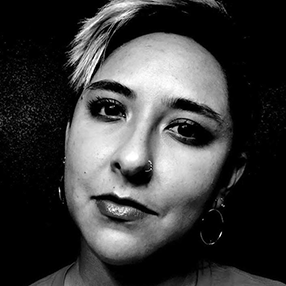Lies I Tell
A woman has a window in her face: that is the truth. I look like my mother: that is the truth. I want to tell you I am not like her: that is the truth. I am ashamed walking in a woman’s body: that is the truth. I wish to take back everything I say: that is the truth. A window can be a mirror. It can also be a door: that is the truth. As a girl, my mother slept in a shack with no windows and one door: that is the truth. My grandma would slam windows: truth. A mother’s hands are stronger than God: truth. We often use fruit to describe a bruise, like plum or blackberry: truth. My mother’s window blackberried: truth. My mother’s door peached: truth. She loves peaches: that is the truth. My father could not stand them in our house: that is the truth. We had three doors and nine windows in our house: that is the truth. A woman has a face in her window: truth. A father has a window but I don’t know where it is: truth. What burrows is the peach fuzz, he said: that is the truth. I have never been close enough to a peach to eat one: truth. The worst things last on the skin: truth. I don’t like not having things: truth. My father has one door but I can’t find it: truth. Not all windows open: that is the truth. One night I see my father crying in the yard, head in his hands: that is the truth. I make things up that I want for myself: that is the truth.
Copyright © 2018 by Sara Borjas. Originally published in Poem-a-Day on September 26, 2018, by the Academy of American Poets.
“So many poems I write feel like a trespass or a betrayal. I wanted to write a poem where I could talk about my parents’ childhoods—my father’s trauma from picking peaches and my mother’s childhood abuse—and their own restrictions on our family’s life without laying blame on my parents or their parents. I heard recently that the best thing you can do for someone you love, but are maybe fighting with, is to view them as children, even though it goes against all our instincts. I wanted to explore how I let, or don’t let, my parents’ childhoods inform my perception of them, my love for them. Or maybe, how I can’t.”
—Sara Borjas

